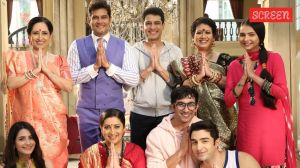Click here to follow Screen Digital on YouTube and stay updated with the latest from the world of cinema.
Aattam review: A magnificent film that brilliantly explores male hypocrisy
There's no simple way to describe Anand Ekarshi's Aattam. It is both a play and a movie. It is also a play within a play within a movie. It is also a courtroom drama, albeit sans a courtroom. However, above all, Aattam stands out as one of the most brilliant Malayalam movies in recent times.
 Anand Ekarshi's Aattam, starring Vinay Forrt and Zarin Shihab in the lead roles, is now running in theatres. (Image: Anand Ekarshi/Facebook)
Anand Ekarshi's Aattam, starring Vinay Forrt and Zarin Shihab in the lead roles, is now running in theatres. (Image: Anand Ekarshi/Facebook)Just when you believe you’ve unravelled a character in this film and understood their true nature, they utter something incredibly banal or logical, completely shattering your perceptions of them. It’s only after a certain point that we realise they are like us and we are like them — taking stances and forming opinions based on convenience and how much of ours is at stake.
There’s no simple way to describe Anand Ekarshi’s debut feature Aattam (The Play), which was recently screened at the 28th International Film Festival of Kerala (IFFK). At its core, the film revolves around a woman who faces sexual assault in a space she had considered safe. Simultaneously, it is about a group of men who come together to ‘discuss’ or ‘investigate’ the matter. At the same time, it is also about the insensitivity with which a patriarchal society responds to such cases. The film also exposes male hypocrisy and how men, ultimately, wield influence even in matters they lack understanding of. It also highlights the issue of men not knowing when to shut up and the denial of opportunities for women to speak. Aattam, simultaneously, shows how the burden consistently falls on women to prove the authenticity of their experiences, whereas men often receive a free pass without needing any explanations. Aattam is both a play and a movie, like KG George’s all-time classic Yavanika (1982). It is also a play within a play within a movie. The film can be likened to a courtroom drama too, albeit sans a courtroom. However, above all, it stands out as one of the most brilliant Malayalam movies in recent times.
Anjali (Zarin Shihab) is the sole female member of a drama troupe called Arangu, which consists of 12 male actors, in addition to the director. The film begins by depicting their preparations for staging a play. Anjali assumes the central female role, while Hari (Kalabhavan Shajohn) takes on the male lead and Vinay (Vinay Forrt) plays a significant role in the cast. Following the play’s conclusion, two of Hari’s non-Indian friends visit backstage to congratulate them and extend an invitation for a stay at their resort in Kochi.
The team accepts the invitation and enjoys the night together. However, after the party, at midnight, Anjali, who is sleeping on a diwan cot by an open window, is groped, leaving her traumatised. A few days later, she confides in Vinay, her romantic partner, about the incident and says that Hari did it. Vinay escalates the matter, though Anjali does not want anything to be done about it and just wanted to erase it from her memories, and brings it to the attention of team leader Madhan who urgently calls for a team meeting of all male actors, excluding Hari. They convene at Madhan’s house to discuss the issue and seek an ‘amicable solution’.
The remainder of the film follows their discussions, arguments and the unravelling of their true selves as tensions rise, especially when personal matters come into play.
The film’s greatest strength lies in its intricately crafted screenplay, deftly transforming a sexual assault into a play, a discussion topic and even a case to be investigated, all without diminishing the gravity of the incident or the fact that it was a crime. Early on, the film employs sharp scenes to effectively explore and reveal the characters, their traits, nature and socio-economic backgrounds through dialogues, actions, attire and even subtle glances, laying the groundwork for the unfolding narrative.
As the actors ‘enter the stage’ for the ‘discussion’ play and gather around a roundtable, reminiscent of Sidney Lumet’s 12 Angry Men (1957), the film takes on the tone of a courtroom drama, with arguments and counterarguments presented by parties with little to no knowledge of the situation. Apart from seamlessly allowing the narrative progress in a gradual real-time pace, in contrast to a play or even a movie, Aattam continually provides new masks and attire to each actor as well, while also disrobing and exposing them in tandem. At the same time, the meticulous precision in the writing of each dialogue enhances the depth of the film. Even with its real-time progression, Aattam maintains its essence as a play, divided into acts, allowing us to witness actors entering and exiting each setting or, at times, the stage itself.
Writer-director Anand Ekarshi adeptly exposes the blatant misogyny, sexism, hypocrisy, ego, envy, lust, selfishness, pseudo-righteousness and more from all the characters evenly, leaving no one untouched. It also ensures that Hari’s presence and command are felt throughout, even when he is absent on-screen. Special commendation is deserved for the emphasis placed on the hypocrisies of the holier-than-thou teacher and former newspaper editor, as people often mistake such superficial persons for good ones.
While Aattam delves into the flaws of these men, it consistently keeps Anjali in focus. The film avoids attempting to victim-blame her in any manner, even when almost all characters utter such dialogues and eventually become rape apologists towards the end for personal gains. The film provides Anjali proper agency and never casts doubt on her for even a single moment, which is indeed laudable for a mainstream Malayalam film.
While every actor, nearly all with theatre backgrounds, delivers spectacular performances, Zarin Shihab stands out with her flawless portrayal, skillfully navigating and effectively expressing all the emotions of Anjali. Vinay Forrt and Kalabhavan Shajohn also excel in their respective roles.
Anand Ekarshi’s adept framing of each shot and the strategic use of various shots, especially close-ups that evoke a sense of necessary suffocation, align with the tone and mood of the respective moments, making the film a true gem. Thanks to his decision to conduct a 35-day workshop before filming, every shot in the film appears nearly perfect, with absolutely no flaws. Cinematographer Anurudh Aneesh and Anees Nadodi’s art direction also warrant special praise for the overall brilliance of the film. Mahesh Bhuvanend’s masterful editing contributes to the seamless flow of the movie. Basil CJ’s music, though filling the screen only when required, effectively enhances instances that demand it.
Aattam movie cast: Vinay Forrt, Zarin Shihab, Kalabhavan Shajohn
Aattam movie director: Anand Ekarshi
Aattam movie rating: 4 stars


Photos
- 01
- 02
- 03
- 04
- 05
































